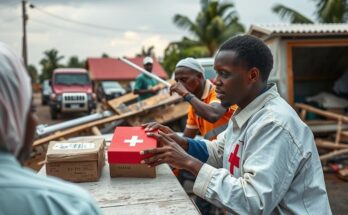The Commonwealth Heads of Government Meeting (CHOGM) in Samoa brings together leaders from 56 nations to discuss pressing issues, notably climate change and slavery reparations. Major discussions focus on the existential threat of rising sea levels faced by small islands and the recent momentum for reparations for the transatlantic slave trade. British Prime Minister Kier Starmer maintains that reparations will not be a formal subject of discussion, though the topic remains a priority for many Commonwealth nations.
The Commonwealth Heads of Government Meeting (CHOGM) commenced on Monday in Samoa, where leaders from 56 Commonwealth nations are convening. A key focus of the summit is the urgent challenges posed by climate change and the issue of reparations for the transatlantic slave trade. The gathering includes dignitaries from nations once part of the British Empire, in addition to King Charles of Britain. On Thursday, climate discussions continue among foreign ministers, with emphasis on the vulnerability of many Commonwealth nations, particularly small island states, to the impacts of rising sea levels. United Nations Secretary-General Antonio Guterres has highlighted that ocean temperatures in the Pacific Islands are increasing at a rate three times faster than the global average, presenting a unique threat to its inhabitants. Australian Foreign Minister Penny Wong emphasized the severity of climate change as the primary national security and economic threat to Pacific nations. Attention is also directed towards the debate over reparations for transatlantic slavery, which has been gaining traction internationally, especially within the Caribbean Community (CARICOM) and the African Union. Despite British Prime Minister Keir Starmer’s stance that the topic will not be formally discussed at the summit, he expressed willingness to engage with leaders who wish to address this issue. CARICOM has established a commission aimed at pursuing reparations from former colonial powers, including the UK, France, and Portugal. Proponents of reparations assert that the legacy of slavery continues to create significant racial inequalities, while opponents contend that contemporary nations should not be liable for historical injustices. A source from CARICOM indicated that CHOGM represents a critical opportunity for dialogue regarding reparations, which remains a priority for many Commonwealth member states. Kingsley Abbott, the director of the Institute of Commonwealth Studies at the University of London, remarked on the importance of engaging with those affected by historical atrocities.
The Caribbean Community (CARICOM) along with various nations of the Commonwealth are increasingly advocating for reparations concerning the legacy of the transatlantic slave trade, which saw over 12.5 million Africans forcibly transported and subjected to slavery between the 15th and 19th centuries. This historical injustice has left a lasting impact on socioeconomic conditions in affected regions, contributing to ongoing issues of racial inequality. The Commonwealth Heads of Government Meeting (CHOGM) serves as a forum for leaders to address these multifaceted challenges, including climate change, which poses existential threats to many small island states within the Commonwealth.
The Commonwealth nations, during the ongoing CHOGM in Samoa, are confronting the critical challenges of climate change and the pressing issue of reparations for historical injustices stemming from the transatlantic slave trade. With climate change being identified as a primary threat to national security and economic stability, discussions are expected to culminate in declarations aimed at ocean protection and other climate initiatives. Furthermore, the debate over reparations is gaining prominence, highlighting the necessity for an open dialogue about past injustices and their continuing ramifications in contemporary society.
Original Source: www.swissinfo.ch




